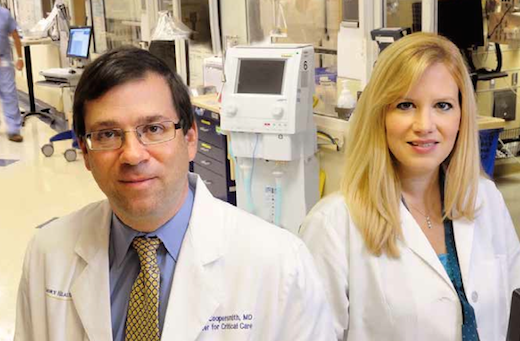Are you experienced? Your immune system undoubtedly is. Because of vaccinations and infections, we accumulate memory T cells, which embody the ability of the immune system to respond quickly and effectively to bacteria or viruses it has seen before.
Not so with mice kept in clean laboratory facilities. Emory scientists think this difference could help explain why many treatments for sepsis that work well in mice haven’t in human clinical trials.

Mandy Ford has teamed up with Craig Coopersmith to investigate sepsis, a relatively new field for her, and the collaboration has blossomed in several directions
“This is an issue we’ve been aware of in transplant immunology for a long time,” says Mandy Ford, scientific director of Emory Transplant Center. “Real life humans have more memory T cells than the mice that we usually study.”
Sepsis is like a storm moving through the immune system. Scientists studying sepsis think that it has a hyper-inflammatory phase, when the storm is coming through, and a period of impaired immune function afterwards. The ensuring paralysis leaves patients unable to fight off secondary infections.
In late-stage sepsis patients, dormant viruses that the immune system usually keeps under control, such as Epstein-Barr virus and cytomegalovirus, emerge from hiding. The situation looks a lot like that in kidney transplant patients, who are taking drugs to prevent immune rejection of their new organ, Ford says.
Ford’s team recently found that sepsis preferentially depletes some types of memory T cells in mice. Because T cells usually keep latent viruses in check, this may explain why the viruses are reactivated after sepsis, she says.
Ford and her team have been focusing on a molecule called 2B4, which is found on memory T cells, regulates their function, and is more abundant during sepsis.
In a mouse model of septic infection, 85 percent of normal mice usually die, but 13 percent of mice lacking 2B4 died. Put another way, not having 2B4 made mice six times more likely to survive. This suggests that a treatment that could block 2B4 from functioning could provide a survival benefit. Ford’s team is poised to try 2B4 experiments with “memory mice,” which have cleared several infections and thus have immune systems that resemble adult humans’ more closely.
The observations of impaired immune function in late-stage sepsis have also led to proposals to try immunotherapy drugs, which wake up exhausted T cells to fight cancer. A clinical trial of one such agent is underway at Emory.
“It’s the opposite of what everybody has been trying for the last thirty years, but it does make sense in light of these recent findings,” Ford says.
In addition, Ford and Coopersmith have been investigating the possibility that not every sepsis patient should be treated the same. The presence of cancer, for example, may so distort the immune system that anti-sepsis treatments that are beneficial in previously healthy mice become harmful. Chronic alcohol ingestion may have similar distorting effects.
“We’re adding in comorbidities that reflect the human condition,” Coopersmith says.

